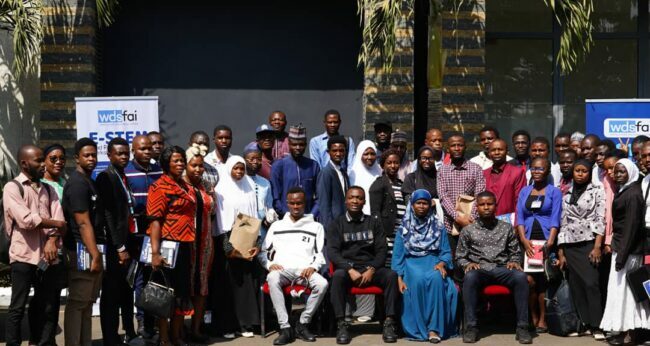To foster creativity and innovation in education, two US organisations—Pratt and Whitney and the North American Association for Environmental Education—have, in conjunction with a non-governmental organisation, Webfala Digital Skills for All Initiative (WDSFaI), organised an E-STEM (Environment, Science, Technology, Engineering, and Mathematics) and robotics training programme for teachers in Kwara State.
At the training programme in Ilorin on Tuesday, Michael Joseph, a robotics specialist who led the training, introduced the participating teachers to the world of robotics, educating them on the basic software and hardware devices used in robotics, like LCDs, motors, and sensors.
“With the theoretical and practical knowledge received, the teachers were able to design and build some autonomous robots like a LED light bar, intruder alarm, voice-controlled LED, ultrasonic robot, and temperature monitoring system using Arduino Uno, a microcontroller platform, and reusable materials.”
Speaking on the need to introduce robotics into STEM education, Joseph said technology skills like coding and robotics have the power to change the world.
He added that it was important to instil in young students curiosity, creativity, and problem-solving skills that will prepare them for the future of work.
Earlier in her address, the Executive Director of the Webfala Digital Skills for All Initiative, Bakare Nafisat, said that the training programme was targeted at educators with limited knowledge of E-STEM and robotics and designed to provide them with the basic technical and practical knowledge required to integrate E-STEM and robotics into their classroom teaching.
Bakare explained that after the training, the teachers are expected to share the knowledge and skills they’ve acquired with their students.
She further disclosed that, as part of efforts to support the growth of robotics education in Kwara, her organisation had selected 17 schools in the state that would be presented with free robotic kits, accompanied by specialised training sessions for their students at no cost.
“Additionally, we will be having a 4-weekend robotics training for children between the ages of 9 and 14, starting on January 27, 2024.
This project is made possible by the support we received from the Pratt and Whitney Foundation and the North American Association for Environmental Education.
We appreciate them for their unwavering contributions to this programme. It is through their collaboration that we are here today, ready to equip schools with the knowledge, abilities, and competencies needed for an innovative and sustainable future.
“Our aim with this project is to introduce young students to robotics and equip them with the knowledge and skills to solve problems through computational thinking and a practical approach using robots.
This project connects students with hands-on learning activities that will enable them to develop technical and problem-solving skills.
At our organisation, we believe that every child deserves an opportunity to be empowered and excel in this technology- and innovation-driven world.
“Since its establishment in 2018, our organisation has trained thousands of teachers, students, and women in a variety of STEM skills, including web development, data analysis, graphics design, and product design, among others,” she said.
One of the teachers who participated in the robotics training, Mr Kareem Aduagba of Ethical College, Ilorin, expressed appreciation to the organisers and promised to impart to his students the skills and knowledge he gained during the training.
Another teacher, Osundeyi Comfort from Aderoju International Schools, said she was delighted to have been selected to participate in the training, which she noted had enabled her to gain insights into the world of E-STEM and robotics.
The organization’s Director of Communications and Strategy, Hameed Muritala, said that the programme had in attendance 60 information technology and IT-inclined educators from various schools across Kwara State, with the participants engaged in hands-on sessions and collaborative projects, which enabled them to gain practical insights into the world of E-STEM and robotics education.
